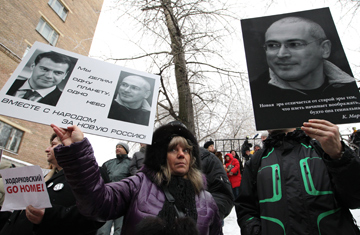
Supporters of oil tycoon Mikhail Khodorkovsky gather outside a Moscow courtroom on Dec. 27, 2010
It must have been an awkward meeting for Russian President Dmitri Medvedev. On Dec. 29, he convened a session with his economic aides to talk about attracting talented businessmen to Moscow. No one mentioned that across the river from where they were sitting, a judge was reading out the guilty verdict of one of Russia's most successful businessmen, oil tycoon Mikhail Khodorkovsky, whose case has scared off a lot of capital from the country. But when the subject turned to Russia's appeal for investors, Medvedev's tone became forlorn: "The investment climate in our country is bad. It's very bad." And everyone understood why.
"No one said it out loud, but of course it's impossible to mention Russia's investment image right now without thinking about Khodorkovsky," a senior official who attended the meeting tells TIME. During the four days it took the judge to read the verdict, Medvedev's credibility among investors was up in the air, and then it collapsed on Dec. 30, when Khodorkovsky got six more years in prison — the harshest sentence requested by the prosecution — added to the eight years he's already serving.
Even for the nation's pessimists this came as a shock, as Russia seemed to have so many reasons to soften its line against Khodorkovsky. In 2003, when then President Vladimir Putin ordered Khodorkovsky's arrest and prosecution for fraud and tax evasion, the move had been easy to justify to the Russian public. Khodorkovsky embodied Russia's hated oligarchs, the men who had exploited the collapse of the Soviet Union to buy up the country's resources at a fraction of their worth. By the time Putin came to power in 2000, these men were effectively running the country — making an example of Khodorkovsky was Putin's way of putting them in check.
But by 2009, when Khodorkovsky was put on trial for a second time — this time for embezzlement and money laundering — even that faulty reasoning no longer applied. Khodorkovsky's previous conviction had already taught the robber barons enough of a lesson. Far from posing any kind of threat, they have since become subservient to Putin and even pay various kinds of fealty, such as funding summer camps for Putin's youth group, buying Fabergé eggs for state museums and providing out-of-pocket subsidies for Russia's most destitute regions. "Everyone understood [the first trial] was a case of selective justice. They all broke the law and only one was put in prison," Igor Yurgens, a top adviser to Medvedev, told the daily Kommersant on Dec. 27. "But today our society is in a different condition."
Most observers conceded, however, that an outright acquittal would take a miracle. Putin has remained as powerful as ever since becoming Prime Minister in 2008, and he has insisted time and again that Khodorkovsky deserves to stay in prison. Releasing him before 2012 would also throw a wild card into the elections scheduled for that year, when Putin looks set to return to the presidency. The former oil tycoon has become a symbol of the opposition during the seven years he has spent in prison so far — what if he decided to run?
But even without releasing him, there were plenty of ways the court could have let Medvedev save face, the simplest being a sentence just one or two years below the maximum. Instead, Judge Viktor Danilkin seemed to needle the defense, convicting Khodorkovsky of stealing even more oil than the prosecution had claimed in its final arguments. His verdict also appeared to misconstrue the testimonies of several defense witnesses. For instance, Russian Industry and Trade Minister Viktor Khristenko testified in June that the enormous volume of oil Khodorkovsky was accused of stealing had never gone missing; in his verdict, the judge inexplicably cited this as proof of the theft.
Through all these twists in the verdict, one thing became clear to Khodorkovsky's lawyers and to many investors in the West: Putin's grudge against Khodorkovsky had again sideswiped the rule of law, regardless of Medvedev's promise of a clean judiciary.
"It seems they've decided they don't care what anyone thinks outside of Russia. So the main implication of this verdict is that Vladimir Putin is giving his finger to the West," says William Browder, whose Hermitage Fund was the largest foreign investor in Russia before 2006, when a conflict with a state-run company got him banned from entering the country. Browder points out that Russian companies have a market value 50% to 70% below their peers in other emerging economies. "The reason is simple: [in Russia], you have property rights conditional on the whims of various corrupt officials who may decide to take [your assets] away from you at any time."
Changing this perception had been a central aim of Medvedev's presidency, and his liberal rhetoric had gone a long way toward achieving it. Western leaders were starting to believe in his commitment to rule of law, major investors were coming around and membership in the World Trade Organization was in reach. But Khodorkovsky's conviction may have unraveled that progress. U.S. Senator Benjamin Cardin of Maryland tells TIME that Russia's WTO membership could now be held up in the wake of what he calls a "clear human-rights violation" against Khodorkovsky. And, as Browder puts it, "any rational investor would have to run 100 miles from Russia based on this verdict." Whatever Medvedev's promises, that would leave Russia's economy running in place.
